Article 95: Dorothy Day – For a better society through love and compassion
Coffee and coffee shops are sources of energy and places for restructuring the ideas of the era, forming progressive movements, and contributing to the construction of an equal and prosperous society.
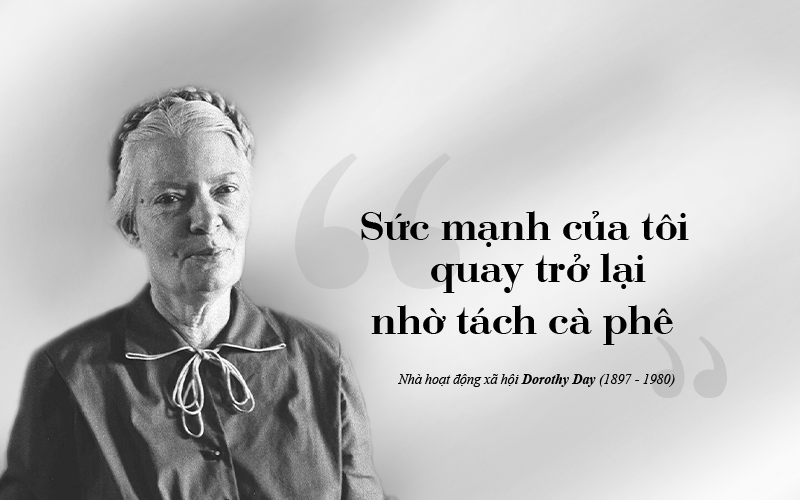
My strength returns to me with my cup of coffee – Social activist Dorothy Day (1897 – 1980)
The space that promotes the aspiration for equality and peace
In the 20th century, American society underwent profound developments in issues of nationalism, modernization, and race through various progressive movements such as the women’s suffrage movement, the 1920s crisis, countercultural movements, liberalism, the women’s movement, and the civil rights movement.
In that context, Greenwich Village, a neighborhood in western New York, became famous as a liberal urban area with a community of progressive residents, clubs, theaters, and coffee shops. It became a refuge for those with progressive and creative ideas and attitudes, including figures like William Faulkner, Eugene O’Neill Robert, Mark Twain, Maxwell Bodenheim, Bob Dylan, and Billie Holiday. Greenwich also became the birthplace of new movements and ideas in various aspects such as art, culture, and politics. It played an important role in creating a diverse and distinctive American cultural landscape in the 20th century and reshaping the zeitgeist regarding social issues like racial discrimination, women’s rights, and gender.
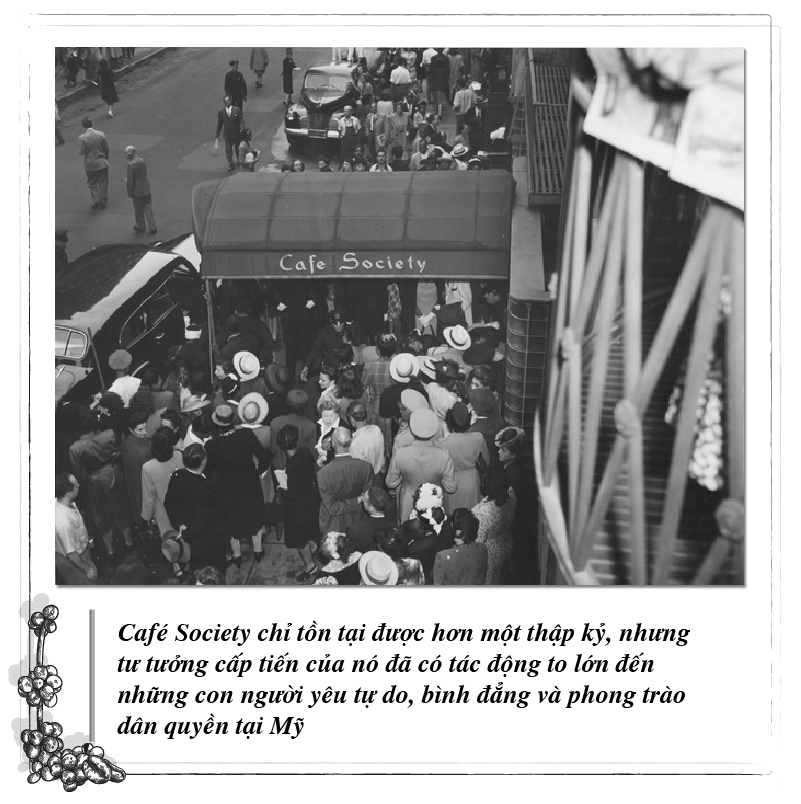
Café Society only existed for a little over a decade, but its progressive ideas had a significant impact on people who valued freedom, equality, and the civil rights movement in America.
Among them, Café Society, established in 1938, was a prominent venue in Greenwich, where racial integration first took place in New York. Unlike other spaces that were exclusively for either Black or White individuals, Café Society treated all customers equally, welcoming members of all races. This was unprecedented at the time. In 1940, Café Society opened its second branch and received positive support, attracting writers, intellectuals, and politicians, including Ralph Bunche, Richard Wright, E. Franklin Frazier, and Eleanor Roosevelt. It was within this open and inclusive environment that intellectuals and peace-loving individuals formed numerous ideas and action plans for a better and more equal world.
With its liberal spaces, gathering progressive intellectuals and scholars with ideas and aspirations for an egalitarian and civilized world, Greenwich had a significant impact on the thoughts and actions of Dorothy Day (1897-1980) – a progressive political journalist, social activist, and advocate for workers’ rights in pursuit of a better society.
The journey of creating a more beautiful society through love and compassion
Dorothy Day (1897 – 1980) is considered the most famous progressive Catholic political figure in the United States. Throughout her life, with faith and courage, Dorothy challenged the prevailing world order and dedicated herself to actions for peace and a better society.
In her childhood, Dorothy Day displayed a strong love for the working people. At the age of nine, witnessing the destructive San Francisco earthquake and the selflessness and compassion of those around her left a profound impression on her.
Notably, Dorothy had a passionate love for reading from her youth and took a particular interest in works about the impoverished, desperate, and chaotic lives of laborers. Authors such as Jack London, Herbert Spencer, Darwin, Peter Kropotkin, Dostoevsky, Tolstoy, Gorky, and especially Upton Beall Sinclair with “The Jungle” deeply influenced Dorothy’s thinking. These works solidified her determination to engage in social activities and challenge the social order that caused suffering for humanity.
After leaving university, Dorothy Day worked for newspapers like The Call and The Masses. She got involved in strikes, protests, and used her pen to advocate for the rights of laborers. During and after World War I, she was a progressive journalist who supported workers’ rights and advocated for a non-governmental, socialist revolution.
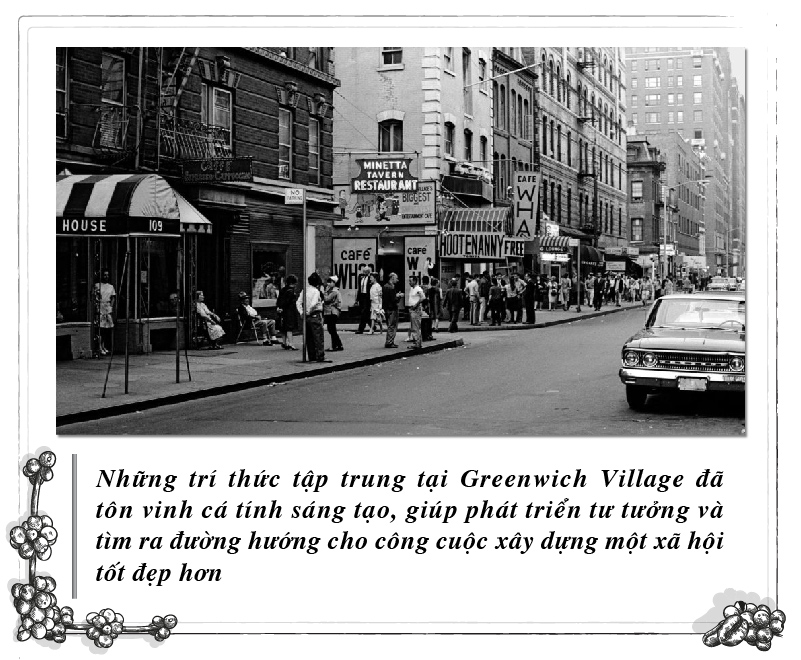
The concentration of intellectuals in Greenwich Village honored creative individuality, helped develop ideas, and charted the course for building a better society.
During her time in Greenwich Village, Dorothy Day frequently visited cafes and clubs to participate in activities with groups pursuing peace. Meeting famous figures there, such as playwright Eugene O’Neill, progressive writer Mike Gold, journalist Anna Louise Strong, and social activist Elizabeth Gurley Flynn, helped expand her thinking and made her realize the individual’s responsibility in building a better society. From this point, Dorothy Day discovered “pacifism” and the calling to “change the world” as a journalist
In 1927, Dorothy Day converted to Catholicism and desired to establish a life filled with joy and love. With her Catholic faith and ideals for the poor, she constantly sought ways to actualize her aspirations for building a better society. At that time, she met Peter Maurin, a visionary social justice advocate.
In the 1930s, Peter Maurin and Dorothy Day collaborated to establish the Catholic Worker Movement. It was a project built on love, boundless enthusiasm, and extraordinary determination from both Day and Maurin to create a new social structure to systematically address the issue of poverty.
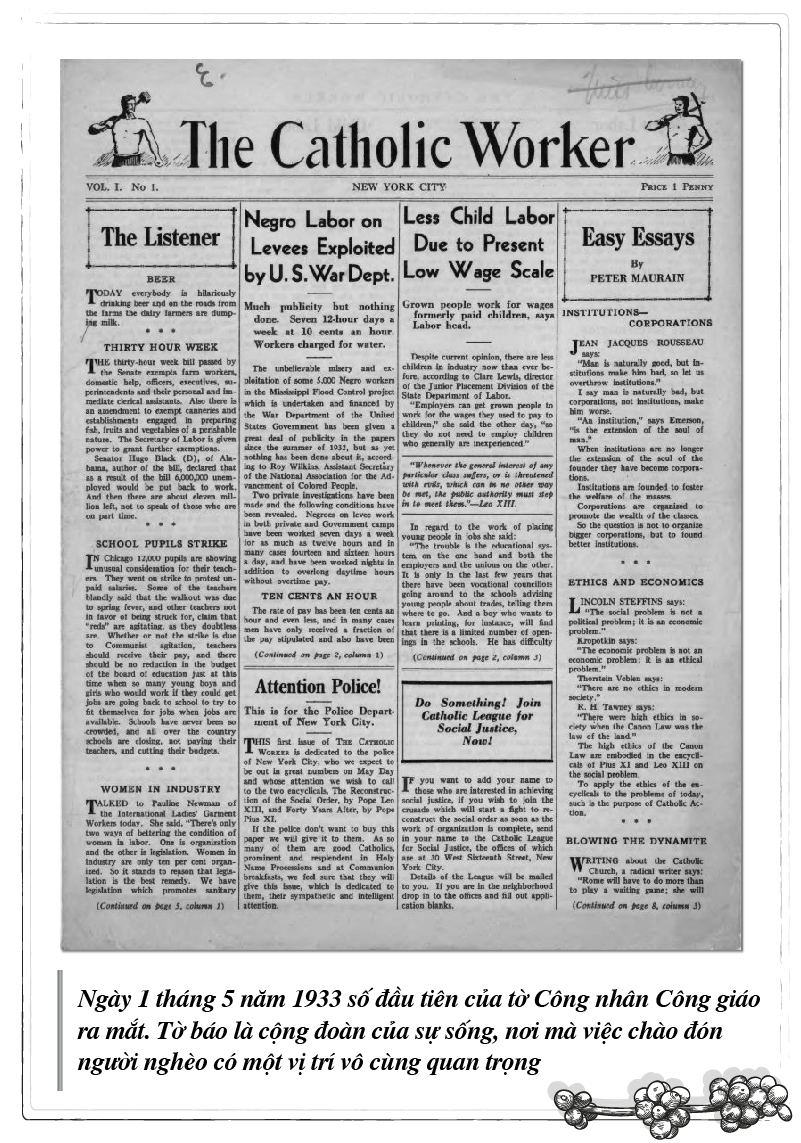
On May 1, 1933, the first issue of The Catholic Worker was launched. The newspaper is a community of life, where welcoming the poor holds an immensely important position.
Dorothy Day participated in writing, editing, and producing The Catholic Worker newspaper, which specialized in providing news about child labor, racial discrimination, and advocating for laborers. Sold for just one cent, the newspaper reached all audiences and social classes. Through this, Dorothy Day contributed to spreading awareness, educating, and influencing the mindset, erasing social divisions, and shaping the understanding of the poor.
Simultaneously, a series of “houses of hospitality” were formed by Day and Maurin to welcome homeless victims. The movement quickly gained support and expanded to other cities in the United States, Canada, and the United Kingdom. By 1936, over 30 Catholic Worker communities were established in the US, and to this day, there are over 150.
With over 75 years of tireless activism, Dorothy Day left behind a significant legacy both within and outside the Catholic community. Among them, a core group of anti-nuclear activists was formed, promoting the movement against nuclear testing and nuclear weapons. Particularly, this laid the groundwork for the major peace movement in the late 1960s.
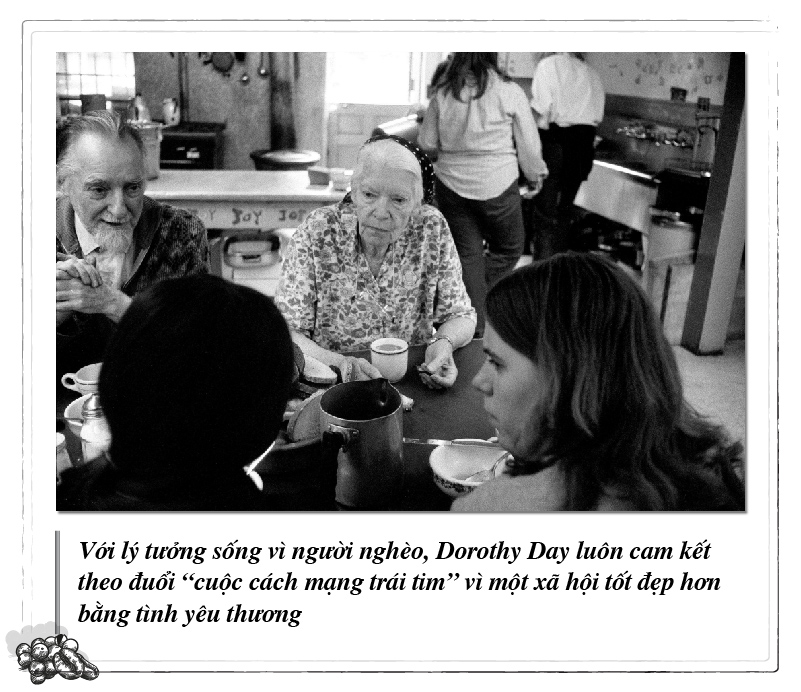
With the ideal of living for the poor, Dorothy Day was always committed to pursuing a “revolution of the heart” for a more beautiful society through love and compassion.
On the journey of pursuing the aspiration to build a more beautiful society through love, coffee and coffee houses served as catalysts and vital connections that opened Dorothy Day’s thinking, fueled her determination, and inspired her actions. The coffee houses in Greenwich became spaces where Dorothy Day connected with like-minded individuals, helping her recognize her responsibility to humanity as a whole and the need to act if she wanted to positively change the world. Meanwhile, coffee served as a daily source of energy for Dorothy Day. Even in the most chaotic times of her life, she would set aside a few hours each morning to enjoy coffee and read the Psalms. She always carried a Bible and coffee with her on her journeys to different lands, as a way to gather additional strength for her commitment to building a peaceful society.
Readers are cordially invited to watch the series of The Tao of Coffee videos posted on https://bit.ly/caphetrietdao
Coming up: Coffee and the formation of artistic movements



